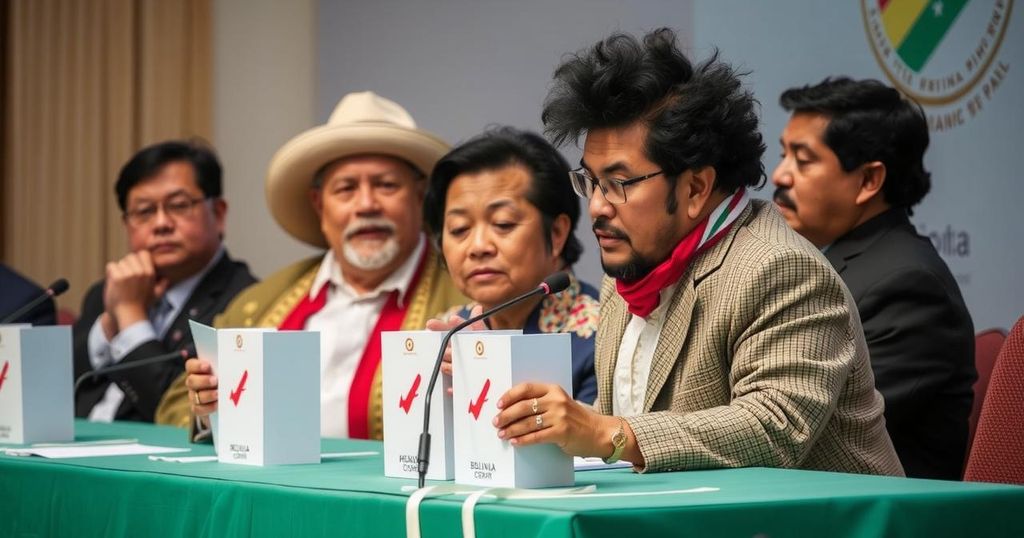World news
ANDRES MANUEL LOPEZ OBRADOR, ASIA, ASSOCIATED PRESS, BOLIVIA, CONSTITUTIONAL COURT, CORRUPTION, CUBA, DEMOCRACY, EL SALVADOR, ELECTIONS, EV, EVO MORALES, GOVERNANCE, LATIN AMERICA, LOPEZ OBRADOR, LUIS ARCE, MEXICO, NORTH AMERICA, PHILIPPINES, SOUTH AMERICA, THE ASSOCIATED PRESS
Li Chen
0 Comments
Bolivia’s Divisive Judicial Elections Highlight Political Tensions and Voter Disillusionment
Bolivia’s upcoming judicial elections on Sunday are characterized by public disillusionment and strict campaigning prohibitions. The elections are the only type of their kind globally, aiming to address corruption but instead raising concerns about politicization. Voter apathy, legal controversies, and significant political rivalries further influence these elections. The integrity of Bolivia’s judiciary and its implications on democracy remain critical issues at stake.
Bolivia is witnessing a significant yet divisive popular vote for its top judicial positions, scheduled for Sunday. Despite strict prohibitions on campaigning, certain candidates have covertly promoted themselves by associating their images with popular snacks and inserting subtle messages into official voting manuals. This election represents a unique occurrence globally, as Bolivia is the only nation holding direct elections for its judiciary, a practice soon to be mirrored in Mexico following a contentious judicial reform led by former President Andrés Manuel López Obrador.
The overhaul aims at reinstating democratic ideals and purging corruption, a goal reminiscent of efforts by former Bolivian President Evo Morales during judiciary reforms in 2009. However, many Bolivian voters express skepticism regarding this election format, suggesting it has politicized the judiciary instead of fostering impartiality. With voter apathy prevailing, some individuals resort to random methods, such as flipping a coin, to cast their ballots, reflecting a broader disillusionment with the process. Critics argue that judicial elections can solidify the ruling party’s influence, erode checks and balances, and jeopardize democratic values across Latin America.
Senior judicial officials are also hesitant to endorse the current electoral system, admitting it has become increasingly controversial and litigated. Complications arose when Bolivia’s Constitutional Court, aligned with President Luis Arce, intervened to delay the elections, exacerbating tensions between Arce and his political rival, Morales. Such delays raise concerns about the legitimacy of the process, with the Inter-American Court of Human Rights expressing alarm over potential threats to the functioning of Bolivian justice.
This electoral round presents unique challenges as only four out of nine Constitutional Court seats are contested, with the remaining judges retaining their posts, which may conflate power dynamics within the court. Historically, voter turnout has been low in previous judicial elections, with many voters opting for null or blank ballots—a trend expected to continue this year. The ideal of electing judges remains contentious, particularly after Morales’ attempts to extend his presidential term sparked significant unrest that ultimately led to his resignation. Moreover, as Mexico observes this electoral event, the implications of Bolivia’s choices will likely influence its own judicial trajectory moving forward.
The topic of this article revolves around Bolivia’s unique method of electing its judiciary through direct popular vote, a practice not common globally. This electoral system was implemented over a decade ago, replacing a more traditional nomination process that emphasized qualifications. Recent political dynamics, including conflicts between prominent leaders like President Luis Arce and former President Evo Morales, have heightened the stakes surrounding judicial elections, raising questions about the efficacy and integrity of the system. With increasing criticisms of politicization, there are broader implications for democracy in Bolivia and Latin America as a whole, especially in the context of reforms in neighboring Mexico.
The upcoming judicial elections in Bolivia underscore significant tensions within the political landscape, particularly concerning the balance of power between factions and the integrity of the judiciary. Despite the democratic intent behind electing judges, voter disillusionment and concerns regarding politicization prevail, threatening the foundational principles of the rule of law in the country. As Bolivia approaches its third round of these elections, the outcomes will not only shape its judiciary but may also have repercussions for the broader Latin American region, particularly as Mexico considers similar reforms.
Original Source: www.voanews.com




Post Comment